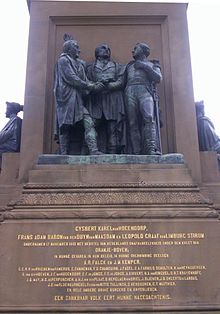The Triumvirate of 1813 (Driemanschap van 1813), or the Provisional Government, governed the Netherlands briefly at the end of the Napoleonic era, before William I of the Netherlands came to the throne. It consisted of Gijsbert Karel van Hogendorp, Frans Adam van der Duyn van Maasdam and Leopold of Limburg Stirum.[1][2]

History edit
The Triumvirate of 1813 was formed on 17 November 1813, after the French governor Charles-François Lebrun and a significant part of the French troops hurriedy left the area of the Dutch departments, which later became the Netherlands, leaving it without a government.[3][4] The withdrawal of French forces was the result of Napoleon's disastrous campaign against Russia, his defeat at the Battle of Leipzig (also called the Battle of the Nations) and the subsequent push back of French forces into France by the forces of the Sixth Coalition.
This Triumvirate issued a proclamation in The Hague on 20 November 1813 in which it took charge of the general government and declared that the Netherlands was free from French rule.[5] The next day a proclamation followed in which a Sovereign Principality of the United Netherlands was proclaimed, with the announcement that there was a General Government of the United Netherlands, in the name of the Prince of Orange, and that all compatriots were released from their oath of allegiance to the French Emperor.[6]
On 21 November, Reinhard Falck was appointed general secretary of the Provisional Government. Before he arrived from Amsterdam on November 29, François Daniël Changuion served as general secretary.[7]
The three statesmen invited by letter the almost forgotten Prince William Frederick of Orange-Nassau, the later King William I of the Netherlands, to come to The Hague and take over the government as "sovereign prince". The purpose of this was to prevent anarchy, or a possible annexation of the Netherlands by Prussia or England.[8]
William accepted the invitation of the Triumvirate and an English frigate took him to the coast of Scheveningen where he set foot on Dutch soil on 30 November 1813. On 1 December, William was proclaimed sovereign prince, which he accepted on 2 December 1813. Four days later, on 6 December 1813, having completed its objective, he disestablished the Triumvirate and took over the government of the country. International recognition of William Frederick as monarch and the first King of the Netherlands, only came about at the Congress of Vienna in 1815.[9][10]
References edit
- ^ "Het driemanschap van 1813". Historisch Nieuwsblad (in Dutch). Retrieved 9 February 2022.
- ^ "Algemeen Bestuur 1813". Parlement.com (in Dutch). Montesquieu Instituut. Retrieved 18 May 2024.
- ^ Ten Zeldam Ganswijk, D.J. (1847). Bijdragen tot de geschiedenis van het staatsbestuur in ons vaderland, en meer bijzonder in het gewest Zuid-Holland, gedurende de jaren 1813 tot en met 1845 (in Dutch). Dordrecht, The Netherlands: Blussé en Van Braam. pp. 18, 25.
- ^ Van Hogendorp, H, ed. (1887). Brieven en gedenkschriften van Gijsbert Karel van Hogendorp (in Dutch). Vol. 4. The Hague, The Netherlands: Martinus Nijhoff. pp. 199–200.
- ^ Ten Zeldam Ganswijk, D.J. (1847). Bijdragen tot de geschiedenis van het staatsbestuur in ons vaderland, en meer bijzonder in het gewest Zuid-Holland, gedurende de jaren 1813 tot en met 1845 (in Dutch). Dordrecht, The Netherlands: Blussé en Van Braam. p. 26.
- ^ "Proclamatie van A.F. van der Duyn en G.K. van Hogendorp, 21 november 1813". Vaderlandse Geschiedenis (in Dutch). Rijksmuseum. 13 May 2015. Retrieved 18 May 2024.
- ^ "Aanstellingen - Algemeen Bestuur (1813) - secretaris". Repertorium van Ambtenaren en Ambtsdragers (in Dutch). Huygens Institute. Retrieved 4 May 2024.
- ^ Van Hogendorp, H, ed. (1887). Brieven en gedenkschriften van Gijsbert Karel van Hogendorp (in Dutch). Vol. 4. The Hague, The Netherlands: Martinus Nijhoff. pp. 262–266.
- ^ "Proclamaties". De Nederlandse Grondwet (in Dutch). Montesquieu Institute. Retrieved 18 May 2024.
- ^ "Algemeen Bestuur der Verenigde Nederlanden". Onderzoeksgids Bestuur en administratie van de Bataafs Franse tijd 1795-1813 (in Dutch). Retrieved 9 February 2022.
External links edit
- Media related to Triumvirate of 1813 (Netherlands) at Wikimedia Commons